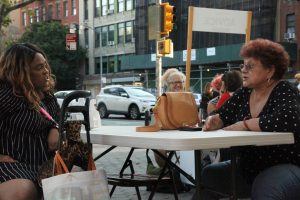From TNI (Trans National Institute) an event with 200 women in Bilbao, Basque Country February 2-7, 2018 on the need for any energy transition to be ecofeminist:
“The growing call for the feminisation of politics – and energy politics for that matter – is about much more than merely increasing the representation of women in decision-making positions. We need to question the ways energy politics are shaped. We need to ask, energy for whom and energy for what?”
The alternative energy model needs to be life-sustaining – protecting collective survival – and needs to take into account the disproportionate impacts the lives of women everywhere.
Any new model needs to acknowledge the diverse roles a multitude of women play in their day-to-day realities and in the global political economy.
The feminist strike on March 8, 2018 saw one in five women take to the streets throughout Spain:
“We strike for a new renewable energy model, distributed, decentralized, democratic, participatory, decarbonized, equitable, fair and in the hands of people. A new ecofeminist energy model in which energy is a right and life is at the center.”
“Energy is currently produced and consumed based on sexist, racist and classist power relations that favour the pursuit of private profits. Groups that are already treated with disdain by many societies are further marginalised, in specific and concrete ways, by the current energy model.”
Gender inequality increases the likelihood of a family suffering from energy poverty
“Today’s political economy still expects – or even requires – women to take on a multiplicity of caring and household roles. Without this unpaid and mostly invisible labour, the political economy could not function. Public services that supply (warm) water, electricity and heating are essential to fulfill these roles. If these essential services were publicly owned and fundamentally democratic they would include women and be grounded in their daily realities – potentially offering a road to equitable redistribution of power and resources.”
How are women rendered invisible? Research by Enginyeria Sense Fronteres(ESF) shows how official data on poverty is not disaggregated by gender. Where data is disaggregated, it shows only a 0.1% difference between men and women…[but]…Data that takes into account individual income shows a very different reality, with 25.7% of men & fully 49.7% of women at risk of experiencing energy poverty.”
…70% of energy aid recipients in Barcelona are women. Single-parent families are at a higher risk of experiencing energy poverty; 80% of these parents are women. In turn, lacking access to a sufficient amount of energy has a negative effect on the development of children. …inequality between genders increases the likelihood of a family suffering energy poverty. Furthermore… analyses of energy poverty and inequality treat women as a homogenous group, ignoring how materially vulnerable groups of women, such as single mothers, women over 65, migrant women, and domestic and service sector workers, are in specific material ways more heavily impacted by the structural injustices of the current energy model.
Undermining energy politics that are reproducing patriarchy as the basis for capitalism
“Extractivist oligopolies and corporatised politics have imposed humiliating austerity measures, privatisations of public services, and excessive and growing socio-economic inequality, displacement and dispossession, and environmental destruction. These processes drive skyrocketing levels of energy poverty and a worsening ecological crisis.”
Not surprisingly, most governments, corporate boards and international institutions that determine societies’ energy policies are dominated by men…We need to question the ways energy politics are shaped.
We need to ask, energy for whom and energy for what? As Alba del Campo puts it, how much and what type of energy do we need and what is it used for?
We need energy democracies and participatory politics in which a variety of ordinary women can influence tomorrow’s energy policies. Collective but diversified bottom-up power can ensure a new energy model is run by and services those who the current model exploits and discriminates against.”
A new energy model that is build on the needs and labour of the social majority of women
“…for a just transition towards energy democracy, the new energy laws and policies must reflect the needs and labour of the social and diverse majority of women.
The Alliance against Energy Poverty’s success in passing Law 24/2015 in the Catalan Parliament is an early sign that ecofeminist energy policies are workable. This law is unique in treating access to energy as a human right. An eclectic group of women affected by energy-poverty participated in its drafting, which, since 2015, and for the first time in the history of Spain, prohibits the cutting off of electricity supplies of vulnerable families in Catalonia.
From Bilbao and Cadiz to Catalonia, the fight for a just energy transition is already under way. With courage and endurance we can make it ever stronger and expose the material impacts of the current, profit-driven energy model on the “multiple many” in distinct yet coinciding ways.
This article was heavily inspired by the Summer Course about Ecofeminist Views, Empowerment and Energy Transitions at the University of Cadiz, July 5-7, 2018.
All photos from It’s Our Park Day from FABnyc


